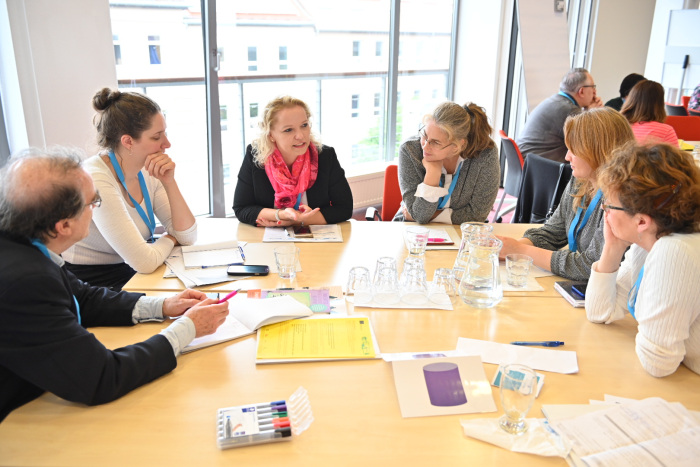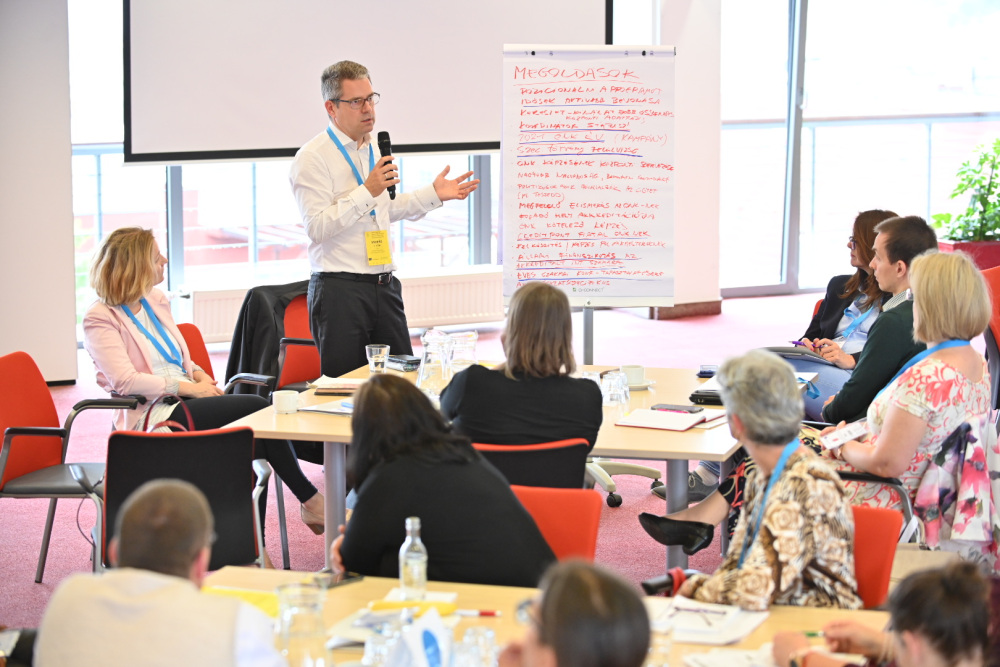
Volunteers can bring extra help, a new impetus and colour to the life of social services. But how do they actually implement their own, customised volunteer programmes? That was the challenge to which SoVol project sought answers; the project involved five Central and Eastern European and a Dutch partner organisations, who set out to develop a methodology for institutions in the social sector, suited to the peculiarities of the region. We talked to Borbála Hadrévy, Coordinator of the Erasmus+ adult education strategic partnership.
Setting Up a Volunteer Programme in Social Services - „It's not enough to give fish to institutions - teach them how to fish.“
| Institution: Volunteering Hungary - Centre of Social Innovation (ÖKA) Project title: Capacity Building in the Social Sector through the Development of Volunteer Programs at Social Institutions in the CEE Region (SoVol) Coordinator: Borbála Hadrévy Website: http://sovol.wordpress.com/ |
What motivated you to implement the project?
Our former partnerships have shown that social services need this kind of help, and our project partners have come to the same conclusion. We considered how we could support these institutions, how we could develop volunteering, and we agreed that it would be useful to integrate volunteers into social services. We knew, however, that it was not enough to give fish to the institutions, we should also teach them how to fish. The goal was to develop a toolbox which they could use to create their own volunteer programmes.
Why is it useful to involve volunteers in a social service?
On the one hand, the staff of these institutions are overburdened, and volunteers would mean some kind of capacity increase, some extra help. On the other hand, this way they can offer certain additional services to their clients which otherwise they couldn't. There's an institution where the volunteers organise a dance club for the elderly and teach them singing, whereas another one can now offer more complex domestic help. It is also important because within the system of domestic help, there's no time for a chat to alleviate the loneliness of elderly people or to accompany them to the doctor's when needed. With volunteers, however, that can also be done.

In order to test the method, pilot institutions in the five partner countries were involved; in Hungary, it was the Social Service of the Local Government of Budafok-Tétény, 22nd district, Budapest. In their case, what did it mean in practice?
One of the key players was the coordinator of the volunteer programme, assigned by the institution itself. It was essential that he or she should know the institution, the clients and the staff, too. The deputy head of the institution was finally assigned, who was really cooperative and enthusiastic.
At the beginning of the pilot process, we organised training sessions for the volunteer managers, mentors and volunteers. Following that, we developed a strategy in cooperation with some staff members of the social service and set the goals we wanted to achieve. Then we gathered together all the staff of the institution and held a sensitisation workshop to brainstorm about the areas that would need volunteers, and we also discussed their fears and doubts concerning the involvement of volunteers.
Special emphasis was laid on the preparation of the mentors, who directly dealt with the volunteers during the programme, and they also prepared the clients of the institution for the arrival of the volunteers. The goal was to get the volunteers support the institution during group sessions.
Were the clients open to receiving the volunteers?
We had mixed experiences in Hungary. The clients of the Social Service are elderly people affected by dementia and people with disabilities. Some of them were absolutely open, but the members of the psychiatric department, for example, rejected the opportunity, so we finally didn't manage to integrate volunteers there.
How, do you think, the operation of the pilot institution and the staff's opinion of the volunteers have changed?
They have learnt a lot. They'd had some former experience in receiving volunteers, but their knowledge wasn't systematic, and they didn't know what activities should be assigned to the volunteers or how to retain them and what the legal aspects were. Their attitude to the volunteers and the volunteer programme became clearly more positive; the difficulty, however, was that the district is far from the centre, which makes it hard to find volunteers in the first place; also, they're only open during business hours, which further narrows down the scope of potential applicants. Nevertheless, they are still actively running the programme: during the pilot, 15 volunteers joined them and are still working with them.

Have any other Hungarian institutions or organisations expressed their interest in the method?
Towards the end of the project, we held a conference, where many inquired about the opportunity. Besides, we have also initiated a process towards the Directorate-General for Social Affairs and Child Protection, the Prime Minister's Office and the Ministry of Human Capacities, who also seem to be open. We have already organised a training session for them, and they also attended our conferences and discussions. At an international level, Russia inquired about the project; there, they are working on developing a national volunteer programme, and they needed our experiences for the planning stage.
Volunteering Hungary - Centre of Social Innovation (ÖKA) has been operating since 2002. How could an organisation with 15 years' experience benefit from this particular Erasmus+ project?
We gained a lot of experience in terms of project management. So far, we have only been involved in Erasmus+ projects as a partner, so managing SoVol was a brand new experience for us and we've learnt a lot from it. We've seen foreign examples and best practices, and we have established new relations in the field of social affairs, too. We gained a new perspective of volunteering, dealing with the social sector, which is quite different from the civil society sector, and it requires different volunteer management, too. During the project, we got acquainted with the specifics of the sector and its typical challenges and peculiarities.
The project must have had an impact on the approach of ÖKA.
That's right. We liked the model we'd seen in the Netherlands a lot, and we learnt a whole new approach. Over there, they have a completely different view of volunteering. They don't even talk about volunteering; they use the word 'activity' to describe the experience. Their operation is different, too: they don't look for volunteers any more, but the work as a linking organisation between SCO's, initiatives and businesses.
Are you planning involvement in other Erasmus+ projects?
Yes, of course. As the continuation of SoVol, another Erasmus+ project has been launched, involving the same team - with exception of the Dutch -, headed by the Slovakian partner. This project focuses on young volunteers. The long-term goal is to rely on various professionals (e.g. youth helpers, instructors) to connect the youths with volunteer programmes which fit into their studies, and thus they can complete the knowledge gained during their theoretical education in a practice-oriented manner.
|
Project values The project seeks to support the efforts of social services which are open to developing and introducing a volunteer programme within their own institution. To this end, the partners have produced practice-oriented manuals and methodological guides, and launched volunteer programmes in 5 pilot institutions. These project products were developed in accordance with the characteristics of Central and Eastern European countries, adopting the best practices of the Dutch partner. The long-term impact of the project is that the social services located in the region established new relations and gained new ideas and inspiration on how to increase their capacities. |
Utolsó módosítás: 2020.07.27.












